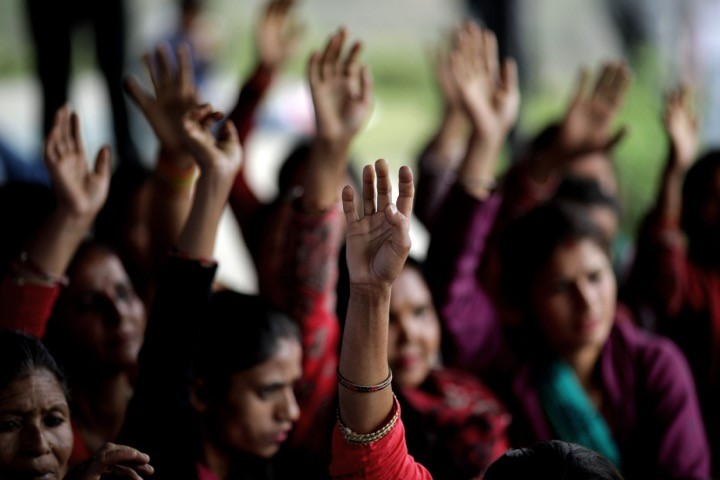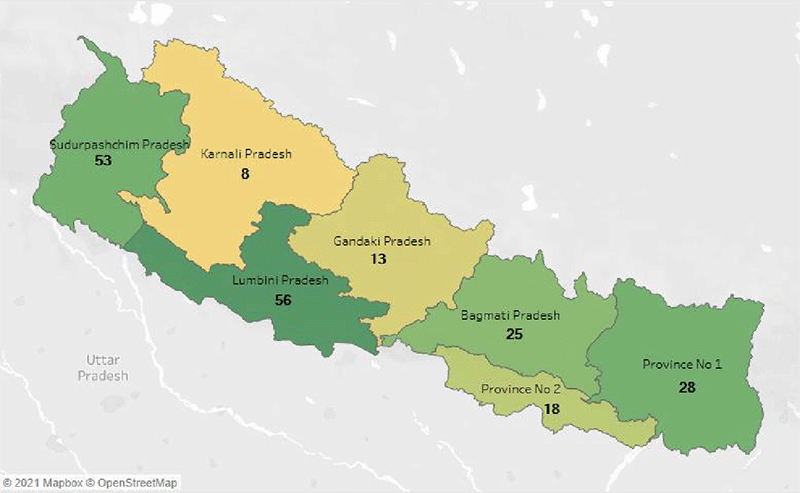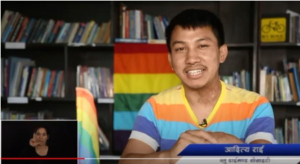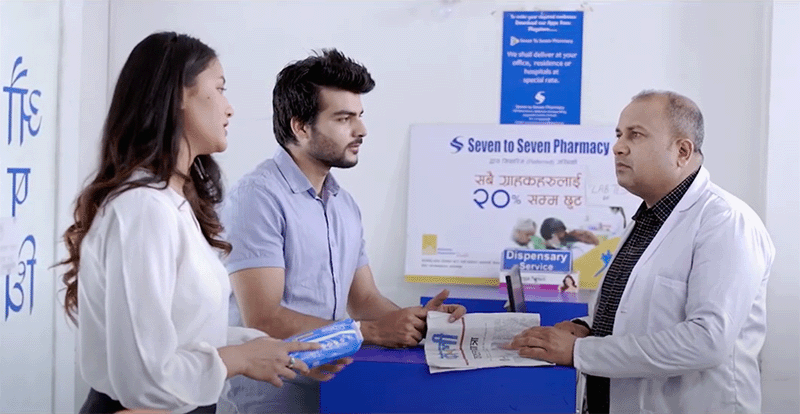Family Planning Association Nepal Is Leaving No One Behind

Created in 1959, Family Planning Association Nepal (FPAN) is the country’s first national sexual and reproductive health service delivery and advocacy organization. Sixty-three years later, FPAN continues to ensure that family planning (FP) information and services are available and accessible to families—no matter their identity, ability, location, gender, or socioeconomic status.
During the 1950s and ‘60s, discussions of family planning and sexuality went against prevailing social norms—so much so, that people used to actively avoid FPAN, even crossing the street to avoid walking past the office. People were embarrassed, and the norm was to encourage people to have many children. In fact, the Nepali saying, “May your children spread across the far-off hills,” would play on Radio Nepal across the country.
A lot has changed since then.
 FPAN now works in 44 districts in Nepal, delivering sexual and reproductive health (SRH) services through 1,232 service delivery points, including fixed facilities, outreach, and mobile clinics. Nearly half of FPAN clients receive services through community-based distribution teams. Inclusivity is at the core of FPAN’s work, with over 88% of clients representing poor, marginalized, socially excluded, and underserved populations. In addition, women make up more than 50% of FPAN board members; staff and the governance structure include youth representatives from all seven provinces.
FPAN now works in 44 districts in Nepal, delivering sexual and reproductive health (SRH) services through 1,232 service delivery points, including fixed facilities, outreach, and mobile clinics. Nearly half of FPAN clients receive services through community-based distribution teams. Inclusivity is at the core of FPAN’s work, with over 88% of clients representing poor, marginalized, socially excluded, and underserved populations. In addition, women make up more than 50% of FPAN board members; staff and the governance structure include youth representatives from all seven provinces.
Given this history of reaching and serving marginalized and under-represented populations, including people with disabilities, those in remote areas, people living with HIV (PLHIV), trafficked returnees, migrant workers, LGBTQI people, sex workers, and others, we asked FPAN to outline its key components for equity and inclusion.
Key Practices to Strengthen Equity and Inclusion
Use Data and Evidence
Evidence-based planning and implementation are crucial for FPAN as it continues to expand its reach to address marginalized and vulnerable populations. Evidence is used to monitor reach, evaluate effectiveness, and plan new activities; therefore, lessons learned are continuously incorporated. As part of its evidence-based, data-driven focus, FPAN has mapped out its catchment areas through household surveys, aided by community workers with extensive knowledge of their areas. Deprivation ranking is used to further understand the socioeconomic status of each catchment area to better reach underserved clients. FPAN captures its service statistics using its poor, marginalized, socially excluded, and underserved indicator, using the evidence to inform program implementation.
Engage Diverse Communities
FPAN supports marginalized communities in claiming their rights to SRH through educational programs tailored to meet their information and service needs. For example, FPAN has produced information, education, and communication (IEC) materials in braille, videos featuring sign language interpretation, and comprehensive sexuality education (CSE) sessions targeting hard-to-reach populations. These CSE sessions are delivered in school as part of extracurricular activities, or outside the school setting by peer educators.
 Väestöliitto
Väestöliitto
FPAN was the first in Nepal to respond to disabled clients’ SRH needs, via the Väestöliitto project in the Kathmandu Valley. The project, funded by the Family Federation of Finland, focuses on changing community attitudes (through communication campaigns and engagement with activists and the media), advocacy, improving the quality of SRH services for people living with disabilities, and knowledge exchange among organizations serving people with disabilities, the Government of Nepal (GON), and other country teams. This video (in Nepali) presents how FPAN reaches people with disabilities through the Väestöliitto project, using sign language and voices from the Blue Diamond Society, which works for the LGBTQI community.
Engage Peer Educators to Mobilize Communities
FPAN actively informs communities about available services through Peer Educators recruited from diverse groups such as:
- PLHIV.
- People with disabilities.
- The LGBTQIA+ community.
Peer mobilization encourages people to inform their own communities about available services and helps build relationships between FPAN and different groups.
Provide Free Services to Those Who Need It
Since 2004, FPAN has had a no-refusal services policy for poor, marginalized, and socially underserved populations.
Provide Sensitive and Stigma-Free Services
FPAN ensures that the SRH services provided through its fixed, outreach, and mobile clinics are inclusive and sensitive to the needs of diverse communities. For instance, mobile camps and outreach clinics are conducted in remote areas, youth-friendly health services and counseling are provided at sites open on Saturdays, and its Youth Centers ensure that adolescent clients are welcomed and comfortable.

Advocate for Inclusive SRH Services
FPAN has a dedicated advocacy unit, established in 2004, that works for inclusive national SRH services. This includes services that are disability friendly and that meet the needs of people with diverse sexual orientation, gender identity and expression, and sex characteristics (SOGIESC), such as gender identity services and hormone therapy. FPAN’s advocacy efforts helped ensure that CSE was included in the national school curriculum and worked to change its introduction from seventh to fourth grade.
In 2014, FPAN’s advocacy efforts, along with those of other key partners, established September 18 as National Family Planning Day. September 18 is the date FPAN was formally established, and the GON’s recognition of this day reinforces family planning commitments and draws public attention and visibility to FP and SRH issues.
 The Government of Nepal, FPAN, and various implementing partners created a music video to bring awareness to SRH and diverse SOGIESC issues. The video is in Nepali and begins with a woman purchasing sanitary pads from a pharmacist, who wraps them in newspaper to make them less visible. A male bystander tells the pharmacist the pads should not be hidden, but openly displayed, because menstruation and SRH issues should be openly discussed and accepted. The couple then drives around town, singing and meeting people with diverse sexual orientations. The lyrics are about acceptance of diversity.
The Government of Nepal, FPAN, and various implementing partners created a music video to bring awareness to SRH and diverse SOGIESC issues. The video is in Nepali and begins with a woman purchasing sanitary pads from a pharmacist, who wraps them in newspaper to make them less visible. A male bystander tells the pharmacist the pads should not be hidden, but openly displayed, because menstruation and SRH issues should be openly discussed and accepted. The couple then drives around town, singing and meeting people with diverse sexual orientations. The lyrics are about acceptance of diversity.
Mobilize Quickly During Emergencies
The 2015 Nepal earthquake and other local disasters, such as the Koshi river floods, highlighted the unique needs of marginalized and vulnerable groups during crises, as they are the most likely to struggle to access services. The International Planned Parenthood Federation’s (IPPF) disaster response initiative, SPRINT, supported FPAN in disaster response preparations, working together within four days of the 2015 earthquake. Since the earthquake, FPAN has trained staff on the minimum initial service package (MISP) and set up supplies for quick response. These efforts helped FPAN quickly mobilize and respond to the COVID-19 pandemic, with services starting up within a month of lockdown measures implemented by the Government of Nepal. Throughout all response efforts, FPAN engages and consults extensively with vulnerable groups and their networks to prepare and provide services.
Collaborate Closely With the Government at All Levels
FPAN coordinates closely with the GON at all levels (federal, provincial, and municipal) and helps complement government services. Maintaining a cordial, collaborative, and supportive relationship with the government institutions provides advocacy opportunities to further the FPAN’s inclusive approach.
Ensure Community Ownership
FPAN is deeply embedded and engaged in the communities it serves: Service sites are established on land provided by the community. In addition, FPAN has a large membership base with 11,000 volunteers, who monitor and regulate service sites as well as assist with seeking funding and support for the organization. As a locally established organization, community ownership has been vital in FPAN’s operations.
We hope these key practices to strengthen equity and inclusion are useful to other organizations and projects working to ensure no one is left behind in our global efforts to reach the FP2030 goals.




